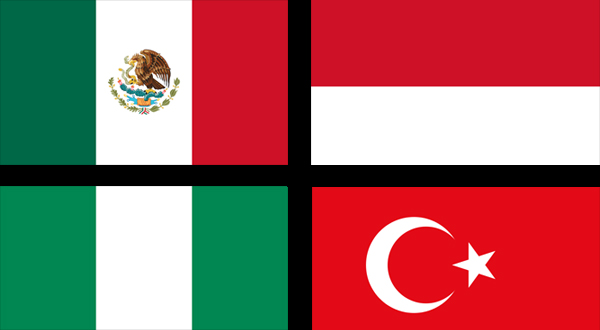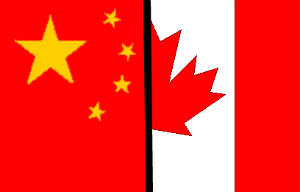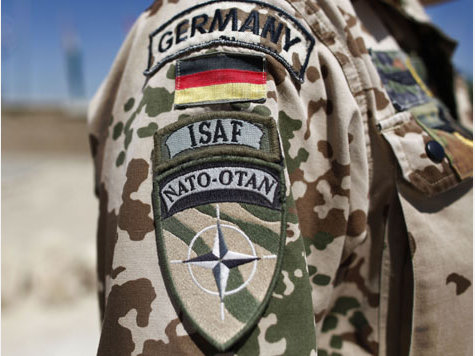In the past decade, we have not stopped hearing about the bloc of countries that will overtake the west one day as the world’s premier group of political and economic powers: Brazil, Russia, India, China and South Africa, or otherwise known as BRICS. However, at a time when our very same world is rapidly becoming multipolar and multilayered, we should give heed to another group of countries that are quickly on the rise on the international stage: Mexico, Indonesia, Nigeria and Turkey – or simply known as MINT. Collectively, they’re not as powerful as BRICS, but they certainly have the potential to alter their regional politics, with some interesting implications for international affairs.

Three of these four countries are already in (Mexico), or about to enter the exclusive club of trillion dollar economies within the next decade (Indonesia and Turkey). Nigeria is one of Africa’s largest economies today, but it is set to overtake South Africa within the next decade. They are strategically located in terms of geography and have the required flexibility in foreign policy to engage with each other, without constraints imposed by arrangements like the European Union. As a leading member of the Economic Community of West African States (ECOWAS), Nigeria’s enhanced economic role will also mean that it will be more involved in setting the tone regionally, in the way of economics, security and cooperation.
While economic recovery in the West has been stagnating for half a decade, the BRICs are starting to slow their growth and engage in economic reforms (less export-oriented, and focussed towards buildingmiddle class). As a result, the MINTs might indeed have the ability to provide an impetus to the global economy and make it even more multipolar. We should not assume that these are poor countries with no ability to affect the global economy. Each one of them is a middle or upper-middle income country, by World Bank classifications, with a multi-profile dynamic economy. In layman’s terms, these economies are not only a good place to put capital, but also can become hubs for moving capital around the world.
As a debt-ridden West withdraws from international activity in response to economic slowdown and BRIC becomes more introspective, MINT might also be the new force of international politics, tackling problems that affect the globe as a whole, from poverty to climate change,and a slew of related issues that fill 95% of evening news everywhere. The difference is that they have the opportunity to operate bottom-up and regionally, which might end up being a more influential policy than top-down strategies in a multipolar world of impermanent and shifting hierarchies.
Below is a basic chart of each country’s main indicators:
|
|
GDP (USD million) |
GDP/capita (USD PPP) |
GDP growth (2013) |
Inflation (%) |
Interest rate (%) |
|
Mexico |
13440765↑ |
12616↑ |
0,84↑ |
3,62↑ |
3,50↓ |
|
Indonesia |
709507↑ |
4271↑ |
5,62↑ |
3,97↑ |
7,50↑ |
|
Nigeria |
262000↑ |
2293↑ |
7,67↑ |
8,00↑ |
12,00− |
|
Turkey |
789000↑ |
13737↑ |
0,90↑ |
7,40↑ |
4,50− |
Source: Trading Economics
These are all middle-income countries, from the low to the high tier of the category.
Even with existing security problems in the north, Nigeria could still attract significant investment in the oil, services and infrastructure sectors, despite suffering a decline in 2013; however, overall investment in Africa has grown over the last year.
Regional leadership is where these countries can shine; Indonesia, being the largest Muslim country in the world can be a natural extension of the influence of the Gulf kingdoms – and this is substantiated by the fact that Indonesia and Saudi Arabia signed their first-ever bilateral defence cooperation agreement earlier this month. The move suggests that Indonesia will be defining a foreign policy scope that’s greater than just being China’s outsourcing destination and choose to be a regional leader, using its Muslim heritage and identity as a foundation.
Mexico’s emerging status as a $2-trillion economy in the coming decade will make it an attractive destination, as well as a source of investment for Latin America. Despite being a part of NAFTA, Mexico may yet choose to re-engage its Hispanic cousins to the south in the context of a new strategic relationship with China.
The MINTs might indeed have the ability to provide an impetus to the global economy and make it even more multipolar.
Overall, MINT will not be the dominant global economic clique, but it could be a consequential middle-power alliance with significant influence on emerging and developing parts of the world, where it could act as an alternative for political and socio-economic development. The growing multipolarity of the world in the 21st century will create spaces and opportunities for alternative action, and more alliances like BRIC and MINT could very well become a regular part of international affairs.




